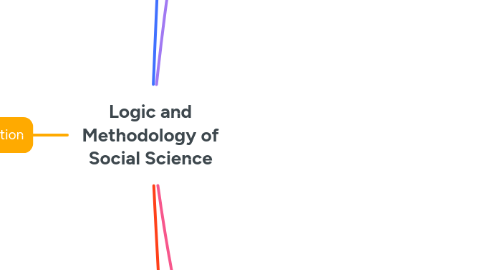
1. Deduction
1.1. His students are called Peripatetics (walking around)
1.2. Syllogism (deductive reasoning)
1.2.1. the conclusion is entailed in the premises --> inference is truth preserving two premises, one cocnlusion, validity depends of the distribution of the terms
1.2.1.1. All men are mortal. All Greek are men. All Greek are mortal.
1.2.2. Major term (mortal)= predicate of the conclusion Minor term (greek)= subject of the conclusion Middle term (men, all)= appears in both premises but not in the conclusion
1.2.2.1. middle term has to be distributed
1.2.3. Argument is a series of sentences which stand in the relationship of premise and conclusion
1.2.3.1. A valid argument simply means the conclusion logically follows from the premises — even if the premises are false.
1.2.3.1.1. Validity concerns the logical structure — whether the conclusion follows from the premises.
1.2.4. Sound argument is both valid and that all the premises are actually true.
1.2.4.1. if sound, then the conclusion must be true
1.2.4.2. all premises are true
1.2.5. Types
1.2.5.1. Barbara
1.2.5.1.1. All, All -> No
1.2.5.2. Celarent
1.2.5.2.1. No, All -> No
1.2.5.3. Darii
1.2.5.3.1. All, Some -> Some
1.2.5.4. Ferio
1.2.5.4.1. No, Some -> Some
1.2.6. Conditions for validity: 1. Exactly 3 terms. 2. Every term used twice. 3. Middle term must be distributed. 4. At least one of the premises stated in affirmative. 5. If one premise is negative, then the conclusion must be negative.
1.2.6.1. Invalid can have true premises and true conclusion by coincidence.
1.2.6.2. Can be valid and still have false premises. (can be valid but not sound)
1.2.6.3. Valid - conclusion follows logically from the premises.
2. Propositional logic (a statement that is either true or false)
2.1. Modus Ponens
2.1.1. If P->Q, P is true, then Q must be true.
2.2. Modus Tollens
2.2.1. If P->Q, not Q, then not P.
2.3. Propositions: - analytic is always true by definition - synthetic depends on facts
3. Induction (appealing to experience, observation; from specific cases to a general rule, not always certain) probabilistic reasoning, the conclusion is not certain.
3.1. Hume
3.1.1. Two objects of human reasoning
3.1.1.1. Relation of ideas
3.1.1.1.1. 2+2=4 Known to be true by demostration, no contrary possible, deduction
3.1.1.2. Matters of fact
3.1.1.2.1. Contrary possible, cannot be proven, justified by experience, induction
3.1.1.2.2. Reasoning for matters of fact is casual inference - process by which we move from observed to unobserved based on past experience.
3.1.1.2.3. Present - absent Watch on the island observed - watch, unobserved - earlier presence of a pearson
3.1.1.3. Casual relations cannot be observed
3.1.1.4. Uniformity of nature: future resembles the past; cannot be shown true
3.1.1.5. foundation is past experience
3.2. Fallacies - mistakes in reasoning. Like it's popular, so it must be true.
3.3. NOT truth preserving
3.4. Begging the question - one presupposing what one ought to prove. petitio principii
3.5. 1) Simple generalisation: every swan i have seen is white -> all swand are white 2) Prediction from past to future: sun always rose in the east, it will rise in the east tomorrow 3) Part to whole inference: part of the ocean is salty -> all the ocean is salty
4. Popper
4.1. There is no induction
4.1.1. Science progress is not by confirming but by falsifying theories
4.1.1.1. hypothesis corroborated - hypothesis survived tests and attempts of falsification. Theory has not be proven false yet.
4.2. Modus tollens: P -> Q. Not Q. Then not P
4.3. Pseudo-scientific if it is never false
4.3.1. Principle of Falsifiability to distinguish scientific theories from non-scientific ones
4.3.1.1. Demarcation line between testable hypotheses and pseudo-scientific sentences
4.4. Problem with the basic sentences that they themselves cannot shown to be true
4.4.1. we still need to agree on some basic statements to make progress. These arguments are not based on certainty, but pragmatic. So they are accepted but not beyond doubt.
4.5. Criticised Logical empiricism
4.5.1. increasing probability cannot verify a theory
4.5.2. protocol statements ae shit
5. Logical Empiricism (developed by Vienna Circle)
5.1. Vienna Circle modern, rely on mathematical logic
5.1.1. Logical Analysis
5.1.1.1. principle of verifiability - consequences of a hypothesis can be ultimately verified
5.1.1.1.1. meaning via verifiability; rejection of methaphysics
5.1.1.1.2. Verifiability refers to the possibility of matching a hypothesis's implications to direct experience, not proving the general statement true.
5.1.1.2. Philosophical problems are either pseudo-problems or reducible to empirical problems via logical analysis
5.1.1.3. Plan: 1. Formulate hypotheses. 2. Deduce singular consequences. 3. Reduce these to protocol statements.
5.1.1.3.1. 1. Hypothesis: All swans are white. 2. Deduction: there is an x such as x is a swan and x is white. 3. Verification: Observe a swan (protocol sentence: this observed swan is white)
5.1.2. Empiricism
5.1.2.1. All knowledge originates from experience
5.1.3. Carnap, Neurath, Hahn
5.1.3.1. Do not claim that hypothesis can be proven strictly, only reduced to protocol statements.
5.2. Frege
5.2.1. propositional and predicate logic
